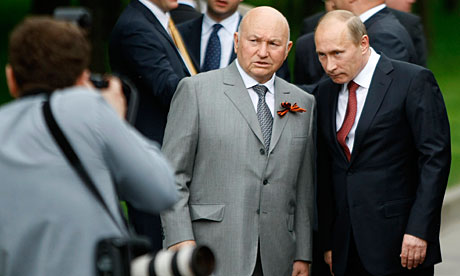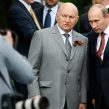
The Court Makes the King
Publication: Eurasia Daily Monitor Volume: 7 Issue: 183
By:

The dismissal of Moscow Mayor, Yuri Luzkov, by President, Dmitry Medvedev, fits neatly in a traditional framework of the center–provinces relations in Russia (EDM, September 28). The rebellious ex-mayor believes the real reason for his dismissal was the presidential administration’s intention to have “their own man” in the capital, Russia’s most powerful region, on the eve of the 2012 presidential elections (The New Times, October 4). Medvedev is keen to build his own political power base before the battle for the center begins.
With the “parade of sovereignties” in the former Soviet Union threatening to disintegrate the Russian Federation, then President Boris Yeltsin had little choice but to grant the Russian regions “as much sovereignty as they can swallow,” in his famous phrase, on the condition they remained within the federation. The golden age of regional emancipation followed with Russia’s then 89 regions adopting their own far-reaching constitutions and economic liberties, some even exempting themselves from federal taxes. As President Vladimir Putin started to “assemble the Russian lands” anew, he first made the regional leaders recognize the supremacy of the federal constitution and legislation. Then Putin ousted the governors from the Federation Council, a regional representation chamber of the Russian legislature, enlarged the regions, reducing their number to 83, and appointed presidential representatives to supervise the governors. In 2004, he abolished the gubernatorial elections, stopping short of turning Russia into the union state it had been under the Tsars. Putin would have also replaced the governors of Yeltsin’s era, some elected to their positions in the early 1990’s, but was cautious not to antagonize them, largely appointing them as regional heads. After all, they had helped him to his first presidency in 2000.
With no personal obligations to the “old guard,” Medvedev has made it clear that no governor should be over 70 years old and serve more than three terms. Between his inauguration in May 2008 and August 2010, Medvedev replaced 51 governors, of which only 11 initiated their retirement, while 31 were made to go (Vlast, August 30). In September, Viktor Tolokonsky (Novosibirsk region), Kirsan Ilyumzhinov (Kalmykia) and Yuri Luzhkov (Moscow) were added. All but Luzhkov agreed to an honorable retirement accepting positions in the Federation Council, state apparatus or public organizations (Russia secured Ilyumzhinov’s reelection as the head of the International Chess Federation, FIDE). Boris Gromov (Moscow region), Leonid Polezhaev (Omsk region), Viktor Kress (Tomsk region), Yevgeniy Savchenko (Belgorod region) are expected to follow (Kommersant, September, 27; Vlast, August 30).
Medvedev needs to create his own political power base, just as his predecessor Vladimir Putin made the United Russia party his political vehicle. While Yeltsin ruled mainly by decree, with the parliament clogged by political infighting, regularly leaving the country even without its budget, Putin ensured that he had a working parliamentary majority on his side. Since its inception in April 2001, the “party of power” invariably supported Putin’s legal initiatives and policies. In the 2007 federal parliamentary elections, Putin headed its list of candidates, and in May 2008 became its chairman (https://www.edinros.ru/rubr.shtml?110112).
The population, first enchanted with Putin’s intention to stump on the chaos of the “rakish” 1990’s, has since tired of his very utilitarian use of the parliamentary democracy. In the regional elections during the last two years, the ruling party either scrambled with difficulties over the 50 percent majority line, as in Tuva (2006) and Briansk (2009) regional parliamentary elections, or simply failed as in Briansk (2009) municipal and Tver (2010) regional parliamentary elections (Vlast, August 30). On October 10, about 8,000 elections, including 6 regional parliaments and 14 city legislatures of the regional capitals, were held. The ruling party won 5 out of 6 regional parliamentary elections, but overall the results were mixed with the parties not represented in the State Duma greatly increasing their representation at the legislatures of various levels.
Medvedev although participating in the party’s functions and, of course, using it to support his legal initiatives, is not widely associated with it. He has persistently, albeit clumsily at times, cultivated his public image of a young, modern minded, high-tech friendly president keen to combat corruption, reform the police force, introduce electronic government, make the economy innovative, and generally modernize Russia. Obviously, he needs similarly minded allies at all levels of power and an administration to realize these ideas. Therefore, he has conceived a new cadre policy. In November 2008, a list was compiled of 100 candidates to make federal and regional appointments by the president. In February 2009, it was supplemented with a 1201 cadre reserve of under 50 professionals from various fields. On September 24, 2010, the second edition of the “first hundred” was issued (https://www.kremlin.ru ).
Among 38 candidates who left the “first hundred,” the majority went on to occupy high positions in the executive or in business, three reached the 50-year ceiling, and two, Anatoliy Brovko and Vyacheslav Gaiser, were appointed as the heads of Volgograd region and Komi Republic respectively. Arguably, the meritocracy of their appointments was blurred as both had formerly served as the vice-head in their region (Kommersant, September 27).
It is open to speculation whether the creation of a presidential cadre reserve would lead to their healthy rotation or the artificial breeding of a new nomenclature. It is clear though that Medvedev has put his stakes on the young cadres, obliged to him for their careers. The average age of the newly appointed governors is under 50. They are to execute Medvedev’s ideas in the regions and to assure his reelection to the presidency in 2012. That is, if he and not Putin, or another political figure becomes the main candidate. The issue is expected to be settled between the president and the prime minister. Medvedev’s new thinking has not gone as far as to deem the reigning duumvirate incompatible with Russia’s modernization, or at least not yet.




